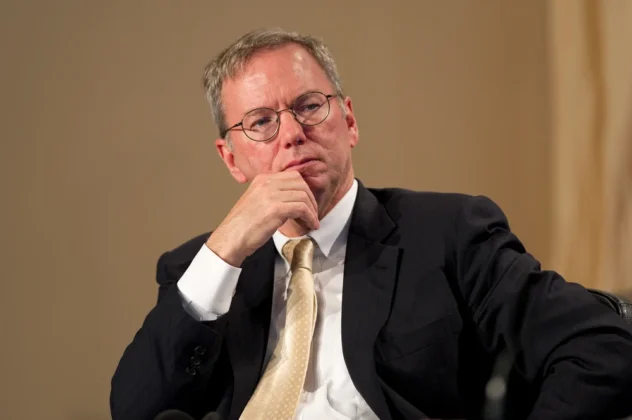Former Google CEO Eric Schmidt has joined the increasing number of well-known figures who have voiced their concerns about the growing popularity of AI-based goods like ChatGPT. His warning of potential “existential risks” from the quickly developing technology and call for AI regulations added to the worries expressed by other tech CEOs.
Schmidt further raised his concerns about Artificial Intelligence (AI) that could potentially harm or kill people in the near future. While speaking to the media on May 24 during Wall Street Journal CEO Council conference, Schmidt expressed his apprehensions about Artificial Intelligence, “My concern with AI is actually existential, and existential risk is defined as many, many, many, many people harmed or killed. And there are scenarios not today but reasonably soon, where these systems will be able to find zero-day exploits, cyber issues or discover new kinds of biology”.
He added, “This is fiction today, but the reasoning is likely to be true. And when that happens we want to be ready to know how to make sure these things are not misused by evil people”.
Schmidt’s comments came when European Union industry chief Thierry Breton stated that Alphabet, Google’s parent company and the European Commission, is planning to create an artificial intelligence (AI) pact to govern the technology.
Earlier in Brussels, he met Sundar Pichai, Google CEO, “Sundar and I agreed that we cannot afford to wait until AI regulation actually becomes applicable, and to work together with all AI developers to already develop an AI pact on a voluntary basis ahead of the legal deadline”.
The details and rules of the AI pact will be decided by the end of 2023 with the support of lawmakers from European Union countries. Last month, the EU parliamentarians drafted Artificial Intelligence (AI) Act which got a preliminary agreement. But the bill will be further debated by the representatives from the Parliament, the Council, and the Commission and will go through refinement before the final draft is released.
Even EU Commissioner for Competition Margrethe Vestager met Google’s CEO and highlighted the importance of AI regulations. She tweeted, “…We need the #AIAct as soon as possible. But AI technology evolves at extreme speed. So we need voluntary agreement on universal rules for #AI now. Already discussed at #G7 digital in Takakasi. We will follow up in the #TTC next week. No time to lose”.
Meanwhile, while talking to the media in London, Sam Altman, Open AI CEO, threatened to leave Europe if his company could not comply with the forthcoming AI regulations. He said, “The current draft of the EU AI Act would be over-regulating, but we have heard it’s going to get pulled back. They are still talking about it. There’s so much they could do like changing the definition of general-purpose AI systems. There’s a lot of things that could be done”.
On May 16, the CEO of Open AI, which created ChatGPT, testified before the US Congress. According to Altman, regulation of artificial intelligence’s “increasingly powerful models” is “critical” to reducing the threats the technology presents. He also mentioned how AI could be used to tamper with the elections is a “significant area of concern”.
In May, the billionaire investor Warren Buffett shared his concerns about AI. He compared the creation of Artificial Intelligence with an atomic bomb.
Recently, the “godfather of AI”, Geoffrey Hinton, raised similar concerns about AI after leaving Google. According to Dr Hinton, companies are developing products based on generative AI but are not fully considering the risks it poses.
In March, OpenAI launched GPT4, which many technology leaders and researchers opposed. Around 1000 technology leaders and researchers signed an open letter for suspending this technology for six months, stating that it poses “profound risks to society and humanity”.
Even India is taking into consideration a legal framework for regulating technology and AI-enabled platforms, such as ChatGPT, at a time when authorities in many places, including Europe and the US, have advocated for AI regulation.
While interacting with the media, IT Minister Ashwini Vaishnaw expressed his concern related to Artificial Intelligence, “The whole world is looking at what should be the framework, and what should be the regulatory setup. In G7, all digital ministers (of G7 countries) are seriously concerned about what should be the regulatory framework. So, this is a global thing. This is not one country’s issue. This has to be looked at from the international perspective”.




















Comments